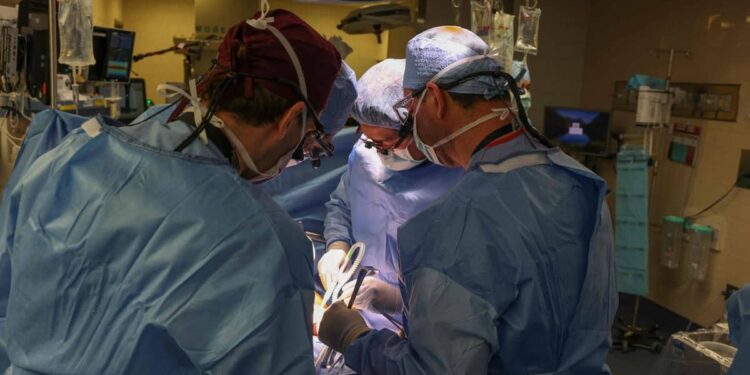Surgeons have transplanted the kidney of a genetically modified pig into a living patient, a first which represents a new step towards a potential solution to the chronic shortage of organ donations, an American hospital announced Thursday.
• Read also: Danish researchers develop an algorithm to predict life… and death
The patient, aged 62, suffered from chronic renal failure. He is “recovering well” from the four-hour operation that took place less than a week ago, on March 16, Massachusetts General Hospital in Boston said in a statement.
Kidneys from genetically modified pigs had already been transplanted, and worked, into brain-dead humans.
Living patients have also previously received a heart transplant from a genetically modified pig, but then died.
The doctors “thoroughly explained to me the pros and cons of the procedure,” said the patient, Richard Slayman, of the town of Weymouth in Massachusetts (northeast).
“I saw this as a way not only to help me, but also to give hope to thousands of people who need a transplant to survive,” he added, quoted in the press release.
AFP
He should be able to leave the hospital “soon,” according to the press release. He had previously received a human kidney transplant, but had had to resume dialysis since May 2023.
More than 100,000 people are waiting for an organ transplant in the United States. The kidney is the most commonly required organ.
“New frontier in medicine”
The field of xenografts – transplants of animal organs into humans – has been advancing at great speed in recent years.
The world first of a pig kidney transplant into a brain-dead human was carried out in September 2021, by surgeons at NYU Langone Hospital in New York.
The kidney was provided here by the company eGenesis.
This operation “represents a new frontier in medicine and demonstrates the potential of genome modification to change the lives of millions of patients around the world who suffer from kidney failure,” declared Mike Curtis, boss of eGenesis.
Xenografts pose a challenge because the recipient’s immune system tends to attack the foreign organ.
The genetic modifications are carried out in order to reduce the risk of rejection: certain pig genes have been removed, and human genes added, using CRISPR technology.
The scientists also carried out “retrovirus inactivation” of the pig to eliminate the risk of infection after the transplant, the press release explains.
“The success of this transplant is the culmination of the efforts of thousands of scientists and doctors over several decades,” said Tatsuo Kawai, surgeon at Massachusetts General Hospital.



